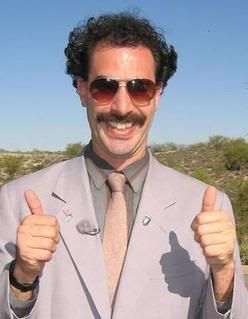
I remember turning on Clerks 2, and being immediately turned off by the technicolor-- something about it didn't feel right. The original's black and white made the convenience store where Dante works seem bleak and depressing-- made even moreso by the steel shutter that wouldn't open. It was the perfect foil for the bawdy, raucous humor that makes up the movie's narrative. However, in Clerks 2, the whole scene reminded me of Dick Tracy-- everything bright-colored and comic-like. Instead of real people having funny conversations... it suddenly felt over-the-top... fake. I didn't get that far into the movie-- a few forced bits that sounded nowhere near as natural as the "Star Wars 2nd Death Star" banter in the original. I have to say, I still haven't watched the whole thing. If someone asked me if I liked Clerks 2, I'd have to say no... but then again, I didn't watch it all.
Why am I getting into this? Well, it seems esteemed movie reviewer Roger Ebert recently wrote a savage 718-word review of the movie "Tru Loved." He bashed the acting, the directing, the script... even the concept of the movie itself. Then, in the last paragraph of his review, he dropped the bombshell:
"Full disclosure. I lifted the words "San Francisco to conservative suburbia with her lesbian mothers" straight from the plot summary on IMDb.com, because I stopped watching the movie at the 00:08.05 point. IMDb is also where I found out about Bruce Vilanch's dual role. I never did see the lesbian mothers or my friend Bruce. For "Tru Loved," the handwriting was on the wall. The returns were in. The case was closed. You know I'm right. Or tell me I'm wrong."Well, needless to say, some readers were a little bit peeved, as, I'm sure, were those involved in making the film. 8 minutes of a 99 minute film is not a great sample size for judgement.
Ebert's defense?
"I started viewing with an open mind and my customary hope that I would enjoy it. I did not. In some way, a film must seal the deal with us. It must make us willing to watch to the end. Even when a film doesn't do that for me, I keep watching because, if nothing else, I can get evidence for a negative review.Now, I have a problem with this. Roger Ebert gets paid, and paid well, to be a movie critic. One reason people listen to him is that they trust him to have an objective view of the movies he sees. He watches the bad movies, so we don't have to. If we watch the first eight minutes and don't like a movie, we can walk out. But as a critic, it's his job to watch those remaining 91 minutes to see if there's any reason we should stay. How many terrible movies have you seen where one scene or one character makes the movie noteworthy? Lethal Weapon 4 was an obscene, unfunny parody of the previous Lethal Weapon films, but it stood out thanks to Jet Li's dynamic villain.
With this film, I believed I had all the ammo I needed, not involving the movie's story, but its competence. It did not seal the deal. It left me with no confidence that it would be able to. If nothing else, I hope the review reflected the stream of consciousness that can take place when a movie loses a viewer's sympathy and goes wrong."
By not watching the rest of the movie, Ebert did not do his job. What he did was present us with a quick lesson in filmmaking 101, but he could have easily applied that criticism to any film. I wonder... if this had been a major studio release with brand-name actors, would Ebert have treated the movie so flippantly? I think not.
Ebert has a great job. He gets to watch movies and write about them. If he only wants to write about movies he likes, he should have a blog on myspace. But if he's going to do his JOB as a critic, he'll need to suffer through bad films the way we suffer through "team building seminars" or TPS reports at our jobs.
Plus, if the guy could sit through "Wild Wild West," (a film I gave up on after 8 minutes) he should have given this film the same courtesy.
No comments:
Post a Comment